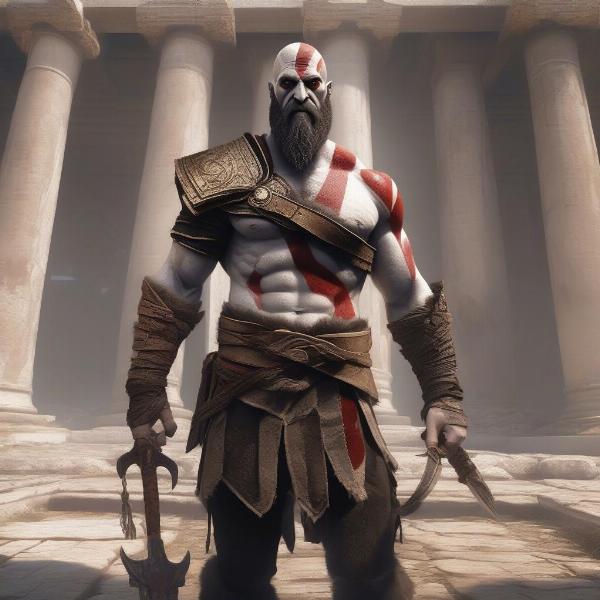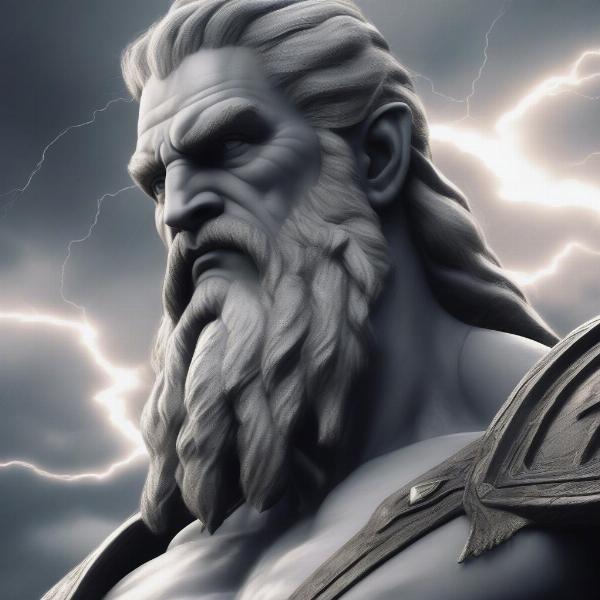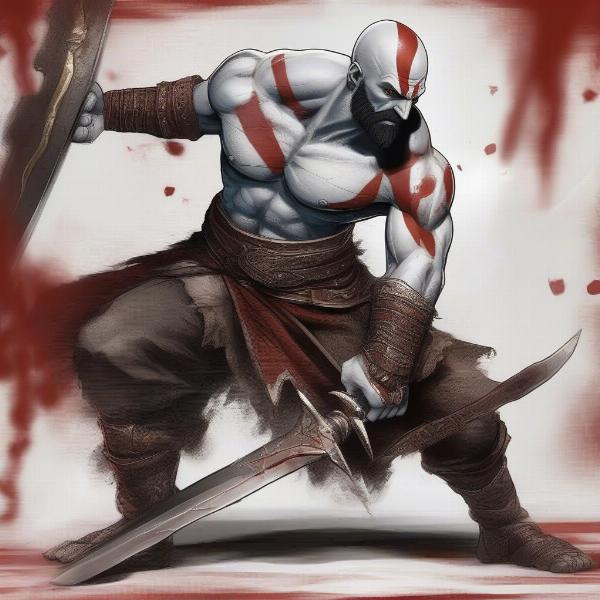The God of War series, a flagship franchise from Sony, has captivated gamers worldwide with its brutal combat and compelling narratives rooted in the rich tapestry of Greek mythology. Here at SupremeDuelist.blog, we delve into what makes these games so resonant, exploring the blend of action, mythology, and character development that defines them. From the tragic tale of Kratos to the breathtaking recreations of ancient Greece, we’ll unpack the core elements that make the God of War experience unforgettable.
This article will journey through the series’ various entries, examining how they each contribute to the overarching narrative and gameplay evolution. We’ll analyze the impact of Greek mythology on the gameplay mechanics and storytelling, discuss the key characters, and highlight how the franchise has cemented its place in gaming history. Let’s delve into the world of gods, monsters, and a Spartan warrior’s quest for vengeance.
The Genesis of a Legend: A God of War Overview
The God of War franchise originally debuted in 2005, introducing players to Kratos, a Spartan warrior consumed by rage and driven by a thirst for revenge against the gods who betrayed him. The core gameplay loop, characterized by fast-paced, visceral combat and puzzle-solving, quickly became a series hallmark. The narrative, heavily inspired by Greek myths, presented familiar characters and tales with a dark and often brutal twist. These elements established the series as a standout in the action-adventure genre. This initial entry immediately set the stage for the epic journey to come, one that would challenge players and their perceptions of Greek mythology.
 god-of-war-kratos-in-ancient-greece
god-of-war-kratos-in-ancient-greece
The blend of mythological creatures, gods, and locations presented in the game was unprecedented at the time, and it was this unique approach to these famous stories that kept players coming back for more. For those interested in the nuances of the series’ lore, the question of whether there will there be another god of war game often arises, a testament to the franchise’s enduring impact. The original game’s success laid the groundwork for future sequels, prequels, and even spin-offs, each building upon the established world of Greek tragedy and godly conflict.
Iconic Characters and Their Mythological Counterparts
One of the most compelling aspects of the God of War games is the reimagining of familiar figures from Greek mythology. Kratos, a Spartan general haunted by his past, becomes a powerful, yet tragic figure, blurring the lines between hero and villain. His interactions with gods like Zeus, Poseidon, and Hades are not simply retellings of ancient myths, but dramatic confrontations that explore themes of betrayal, revenge, and the consequences of hubris. The game introduces new dimensions to well-known deities, making them complex and flawed characters within a grand narrative.
Many secondary characters, such as Pandora, Athena, and Ares, are also reinterpreted with a darker and more tragic edge. This fresh perspective of classic characters allows players to engage with familiar tales in a brand-new light. These portrayals also add depth to the overarching plot, further making the player question the very nature of good and evil. Even in god of war betrayal game, the handheld installment, the focus on these complex relationships continues.
 zeus-god-of-war-greek-mythology
zeus-god-of-war-greek-mythology
Gameplay Mechanics and the Greek Setting
The combat system in the God of War games is a significant contributor to the franchise’s popularity. Players engage in intense, visceral battles with mythical creatures like harpies, cyclops, and minotaurs, often using a variety of weapons and magical abilities. The sense of power Kratos wields is directly tied to his mythological nature, making for a very satisfying experience that seamlessly blends action with fantasy. The environments are also highly interactive, featuring puzzles and platforming sections that use the unique setting of ancient Greece.
The game’s environments play a crucial role, with each level offering stunning vistas of ancient Greek temples, landscapes, and the Underworld. These locations are not just static backdrops, but rather integral parts of the game, often featuring their own unique hazards and challenges. The ability to explore these locations, often with a sense of scale and grandeur, is a key element in the series’ appeal. As the series evolves, players often wonder about the future, such as when the god of war next game might appear.
The Impact of Greek Mythology on the Narrative
The God of War series is far more than a simple action game; it’s a tragic epic that explores themes of vengeance, betrayal, and the corrupting nature of power, all heavily influenced by Greek mythology. The story of Kratos is deeply intertwined with the myths, gods, and creatures of that world, presenting a dramatic interpretation of ancient narratives. The games delve into the darker aspects of these stories, showcasing the consequences of the gods’ actions and the often-brutal realities of mythology.
The narrative’s strength lies in how it takes well-known myths and recasts them in a compelling new light. Kratos’s personal journey, filled with loss, rage, and a desperate need for redemption, elevates the series from simple combat encounters to something far more profound. The consistent engagement with classic narratives provides a familiar, yet refreshingly new experience for players. The level of engagement is so high that some players might even be curious about the existence of a sex mini game god of war, which is a clear indication of their immersion into the game’s universe.
Evolution and Legacy of God of War Greek Mythology Games
Over the years, the God of War series has seen significant evolution, especially in terms of gameplay mechanics and narrative complexity. The sequels continue to build upon the established lore, introducing new characters and deepening the tragic tale of Kratos. The shift from the classic fixed-camera perspective to a more intimate, over-the-shoulder view in later entries marked a significant turning point for the series, showcasing an evolution of game design that reflected new technological possibilities and offered players an entirely new type of experience.
The franchise’s legacy goes beyond its innovative gameplay and epic storylines. It has become a staple in the action-adventure genre, influencing countless other games with its dynamic combat and powerful storytelling. The consistent quality and innovation seen throughout the series have solidified its position as one of the most beloved and critically acclaimed franchises in gaming history. The potential for future games in other mythologies, rather than just god of war game aztec, continues to keep fans excited and engaged with the franchise.
 kratos-ready-for-battle-god-of-war-greek-mythology
kratos-ready-for-battle-god-of-war-greek-mythology
Frequently Asked Questions
What is the main setting of the God of War series?
The main setting for the original God of War games is ancient Greece, where players explore iconic locations from Greek mythology.
How does the game interpret Greek mythology?
The game presents a darker, more violent interpretation of Greek mythology, focusing on themes of betrayal and revenge, while reimagining classic characters.
Who is the main character in the God of War games?
The main character is Kratos, a Spartan warrior who becomes a God, driven by a desire for vengeance against the Olympian gods.
What are some common enemies in God of War games?
Common enemies include mythological creatures like harpies, cyclops, minotaurs, and various shades of the dead, each presenting unique challenges.
How has God of War evolved over time?
The series has evolved in terms of gameplay, switching to an over-the-shoulder perspective in later entries, and in its narrative complexity.
Conclusion: The Enduring Appeal of Greek Mythology in Gaming
The God of War series stands as a testament to the power of combining engaging gameplay with rich, mythological narratives. The games expertly blend brutal combat, puzzle-solving, and a tragic storyline, all within the vivid backdrop of ancient Greece. The story of Kratos, while fantastical, resonates with players because of its exploration of relatable themes of betrayal, loss, and redemption. Here at SupremeDuelist.blog, we recognize the enduring appeal of this franchise and its significance in the gaming world. The God of War Greek mythology games have created a legacy that will continue to influence and inspire for years to come. We encourage you to explore this epic series and discover its many layers of depth and excitement.
Leave a Reply